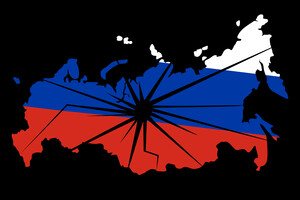Russia's isolation will intensify.

Loss of imports from Western countries may reduce Russia's GDP , depending on the scenario, by 4-18%, and exports – by 1-25% , estimated at the Institute of the Bank of Finland. Russia will be able to mitigate the effects of sanctions, but this will require alternative markets. This is stated in a study by the Institute of Transition Economies of the Bank of Finland (BOFIT, an institute specializing in the analysis of the Russian economy), according to Russian media. A scenario analysis of the effects of Western trade sanctions is presented in the work of BOFIT, published on May 10.
The expert took as a basis the “cost-output” table for 2019 for Russia and other countries from the database of the Asian Development Bank (Rosstat builds similar tables for Russia, xlsx). Such data systems, in particular, show how many and which imported products are used in different sectors of the economy. In the case of imports to Russia, three scenarios were considered: the current sanctions regime (ban on the supply of dual-use goods, various technologies, luxury goods, etc.), the scenario of extending the embargo on all goods and services of developed countries and a conditional-extreme scenario all countries.
“As cost and output data are presented at a relatively high level of aggregation, we roughly position the current sanctions regime as a cessation of exports to Russia from developed countries (EU, US, UK, Switzerland, Norway, Australia, Canada, Japan, South Korea and Taiwan) in the fields of mechanical engineering, electrical and electronic equipment, vehicles, aviation, financial intermediation and business services “, – explains the author.
“We calculate the share of imports from these countries in the relevant industries in the use of all manufacturing sectors in Russia. For simplicity, we assume that these imports in the short term cannot be replaced by domestic production or imports from other countries. Thus, the output will fall on imports, which fell out proportionally. Then we calculate the level of spread of these output losses to other industries through intersectoral linkages to assess the effect on total output and value added in the economy, “- writes Simola.
Recall that it was previously reported that The Russian Ministry of Economic Development expects the Russian economy to fall by 8.8% in 2022.
Read also: The United States may impose sanctions on banks that help Russia circumvent restrictions
Prior to that S&P analysts gave ten years to recover the Russian economy to 2021. The company forecasts a reduction in GDP this year by 11.1%. They predict that by 2023 the decline will slow to 1.9%, and for the year – to 1.6%. But by 2026, the aggressor's GDP will increase again by 1.9%.




